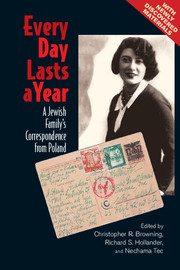Book contents
- Frontmatter
- Contents
- Introduction and Acknowledgments
- People Frequently Mentioned in the Correspondence
- EVERY DAY LASTS A YEAR
- PART ONE JOSEPH'S STORY
- PART TWO CRACOW
- PART THREE THE LETTERS
- 1 Letters without Reply: November 1939–May 1940
- 2 Separation Anxiety: May–August 1940
- 3 Exit Strategy: September–December 1940
- 4 Familial Love, Penned: January–December 1941
- Index
- Plate section
2 - Separation Anxiety: May–August 1940
Published online by Cambridge University Press: 12 October 2009
- Frontmatter
- Contents
- Introduction and Acknowledgments
- People Frequently Mentioned in the Correspondence
- EVERY DAY LASTS A YEAR
- PART ONE JOSEPH'S STORY
- PART TWO CRACOW
- PART THREE THE LETTERS
- 1 Letters without Reply: November 1939–May 1940
- 2 Separation Anxiety: May–August 1940
- 3 Exit Strategy: September–December 1940
- 4 Familial Love, Penned: January–December 1941
- Index
- Plate section
Summary
The threat of expulsion was the most serious challenge confronting the Jews of Cracow in 1940. The trouble began in October 1939, when the Nazis appointed Hans Frank to the post of governor general of occupied Poland's General Government (General Guberniya). Believing that Cracow was “an old German city,” Frank made the city the territorial capital. He felt, however, that Cracow's large Jewish population was unbecoming of a Reich capital. Consequently, in the spring of 1940, Frank began the “dejewification” process of Cracow, mandating that no more than 10,000 Jews could remain in the city. On May 18, 1940, the Nazis issued a decree giving the Jews three months to “voluntarily” leave Cracow and move elsewhere within the territory. As an incentive, the Nazis announced that those who left by August 15 would be allowed to take all their possessions. The Jews who remained at the deadline risked expulsion and would only be allowed to leave with 25 kilograms of baggage per person.
Although thousands of Jews left Cracow “voluntarily,” there were far more than 10,000 Jews remaining in the city on August 15. In accordance with his threats, Frank established a joint Jewish–German eviction committee, which was responsible for expelling Jews from Cracow. The committee was authorized to issue permits, or “postponement documents,” for Jews to stay in the city. To Frank's dismay, the number of permits that were issued far exceeded what he considered desirable. Nevertheless, more than 3,700 Jews were forced to leave Cracow in 1940.
- Type
- Chapter
- Information
- Every Day Lasts a YearA Jewish Family's Correspondence from Poland, pp. 128 - 168Publisher: Cambridge University PressPrint publication year: 2007



